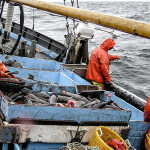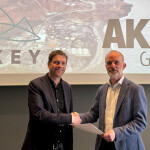The text of the National Sustainable Offshore Aquaculture Act of 2009 is now available online. Rep. Lois Capps (D-CA) introduced the bill, which would set up a regulatory framework to permit offshore fish farms in federal waters, on Dec. 16. The bill's intent, according to Rep. Capps, is "to preserve the integrity of our fragile ocean ecosystems, meet the increasing consumer demand for seafood, reduce stress on wild fish populations, and create jobs here at home."
However, not everyone agrees. On Monday, Food & Water Watch Executive Director Wenonah Hauter issued a blistering response to the bill, calling it "unnecessary and not a step toward protecting our oceans and fishermen’s jobs from harms associated with ocean fish farming."
Judging by Hauter's comments, Food & Water Watch seems 100% against any expansion of the aquaculture industry offshore, instead encouraging the development of land-based, recirculating systems. This steadfast position promises legislative and legal battles ahead. I've requested an interview with Hauter to better understand Food & Water Watch's position.
For now, I'll republish the majority of Hauter's statement here:
"While Representative Capps may intend legislation as a safeguard against a piecemeal approach to developing and regulating ocean aquaculture, the ultimate effect is of streamlining the process for the industry to better establish itself in the U.S.
"Ocean fish farming can have devastating effects on the environment and fishing jobs and produce lower-quality fish for consumers. Environmental problems can include escapement of fish, pollution of surrounding waters with excess feed and fish waste, and transmission of parasites and diseases to wild populations. These problems will not be fully mitigated by the bill, which enforces very limited liability for damages to natural resources.
"Economically, fish farms can undercut the prices that local fishermen receive for their catch, further threatening an already vulnerable job market. This industry is not a solution to the question of how to meet the growing demand for seafood.
"While many proponents of the bill cite the undesirable situation of a piecemeal approach in regulating the industry as the reason the bill is necessary, in reality, there is no existing industry to regulate. Hawaii has two open ocean fish farms in operation, but they are located withinstate waters, so will not be affected by this legislation. A permit applicant in California for what would have been the first offshore fish farm in U.S. federal waters recently pulled out of the drawn-out permitting process.
"Rather than continue with legislation to regulate (and thus allow) ocean fish farming, Representative Capps should instead support legislation that would prevent the growth of this industry. To supplement U.S. seafood production and increase green jobs, a much more sustainable approach is necessary. Representative Capps should support the exploration of aquaculture techniques that have fewer negative environmental and economic impacts, such as land-based, recirculating systems, also called RAS.
"RAS are land-based, scalable, closed-loop facilities that retain and treat water within the system, eliminate the threat of escapes, reduce the discharge of waste and the need for chemicals or antibiotics, and can be developed in communities throughout the country. There is growing support and demand for RAS rather than using outdated ocean fish farming methods that can come with serious problems."
What do you think of H.R. 4363?
What do you think about Food & Water Watch's position that open ocean aquaculture should be avoided in favor of encouraging land-based, recirculating systems?
Read SeafoodSource editor James Wright's commentary "Just a Bill on Capitol Hill" on H.R. 4363
*Originally posted to The New Aquaculture on Wednesday December 30, 2009.
January 6, 2010





